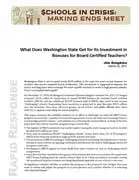Washington State is set to spend nearly $100 million in the next two years on pay bonuses for teachers who receive national board certification. This investment is supposed to improve the state’s teaching force and encourage the most capable teachers to work in high-poverty schools. Does it accomplish those goals?
This paper examines the available evidence in an effort to shed light on what the NBCT bonus program set out to do—namely, to reward strong teachers across the state and encourage them to teach in high-poverty schools—and whether it is achieving the desired effects. A study of the four years since the current incentive program began reveals that:
- The number of NBCTs statewide has nearly tripled, causing the state’s program costs to escalate by about $10 million per year;
- Even with an additional $5,000 “challenging schools” bonus, fewer than 1% of Washington’s NBCTs move from low-poverty to high-poverty schools each year;
- The proportion of NBCTs teaching in challenging schools is increasing, but only because teachers already in those schools are gaining certification and because the state’s challenging schools list has grown each year;
- Washington’s NBCTs appear no more likely than other teachers to stay in challenging school assignments;
- Some districts have worked hard to garner more bonuses for their own teachers. Per-pupil state NBCT bonus funding varies by a factor of more than 15 to 1 from one district to another, raising the question of whether bonuses are being distributed equitably across schools in the state.
As legislators consider whether to restore the program to the proposed state budget, they may want to review and adjust the program as it now operates and consider whether it is achieving what they had hoped.




